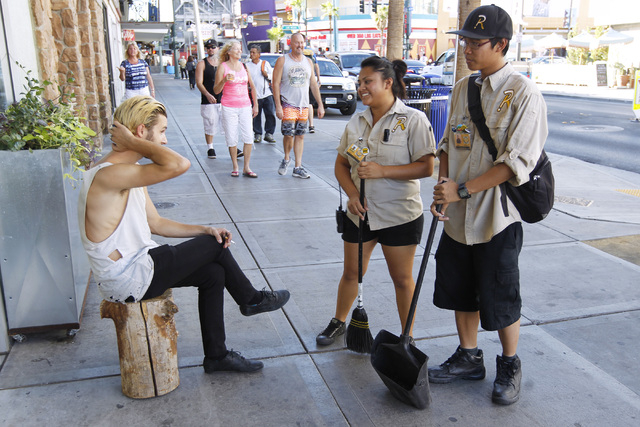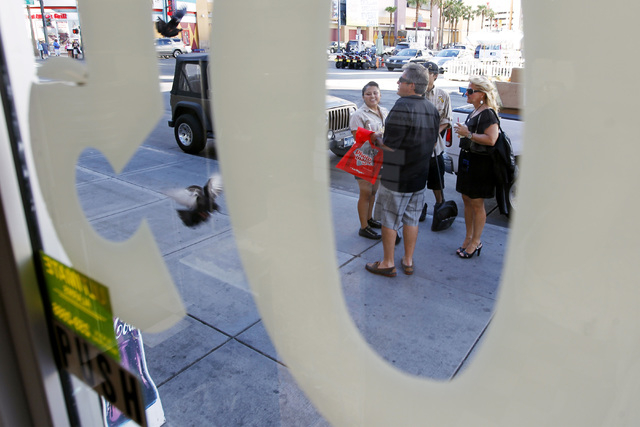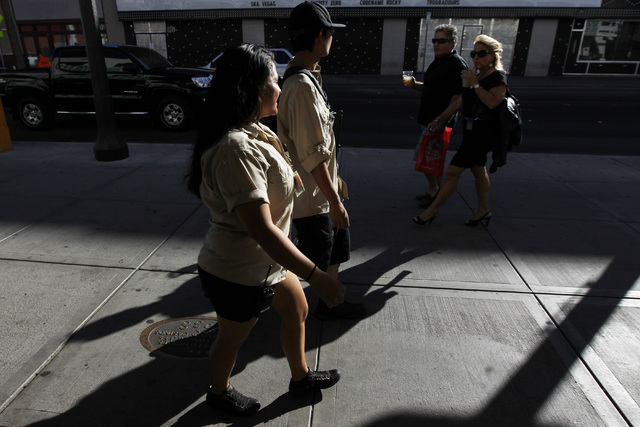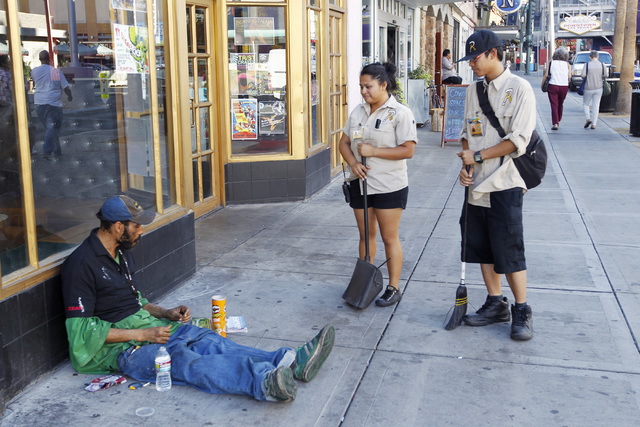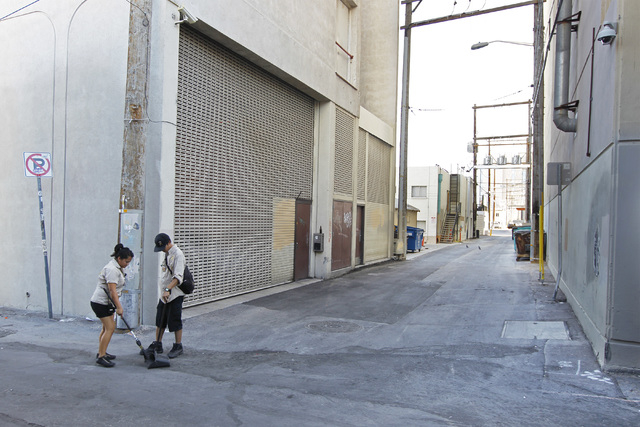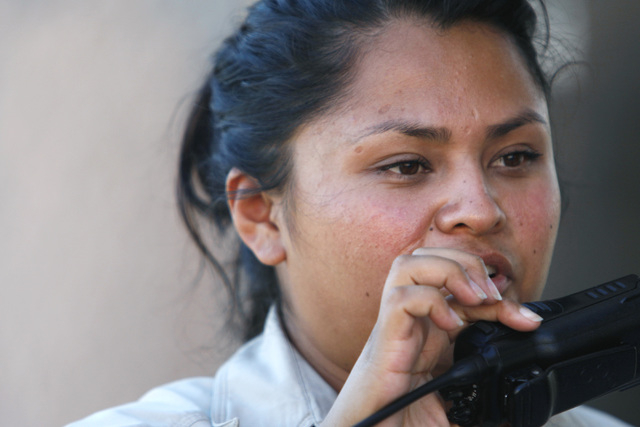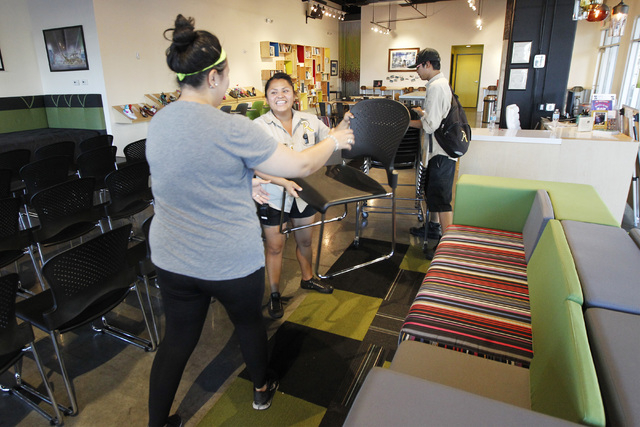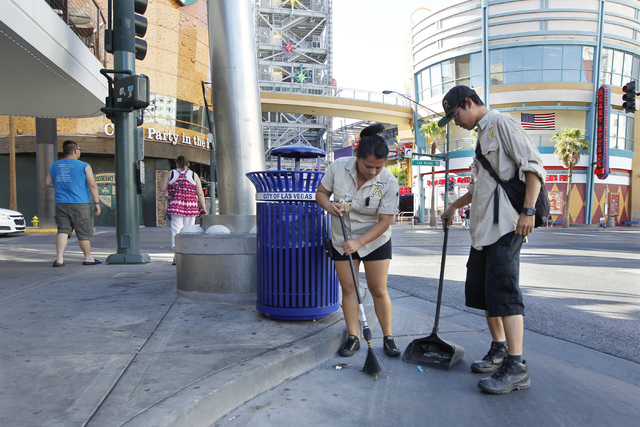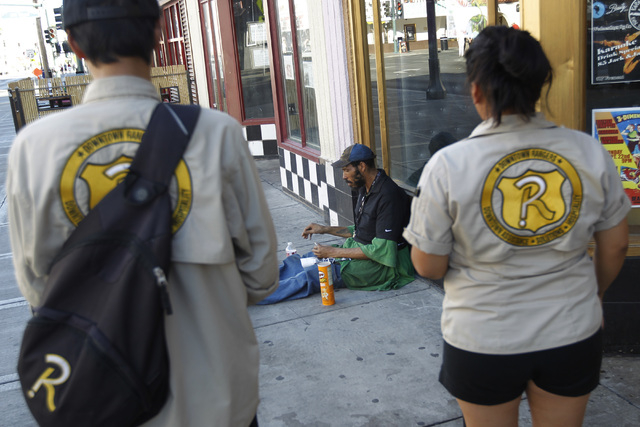Rangers work to create ‘most enjoyable downtown experience’
It’s nearly three hours into their patrol shift on a Tuesday afternoon when Downtown Rangers Wathna Reth and Teresa Reyes see a man stumbling along Fremont Street.
He isn’t the first person they have talked to who appears drunk; it certainly won’t be the last. But Reth and Reyes are here to help all people in the downtown area.
“You need water, sir?” Reth asks.
He nods. Reyes dashes into the bar Park on Fremont to get him a cup while Reth chats with the guy.
“I’m Pete, but you can call me re Pete,” he says. “I call myself re Pete because when I’m drunk, I say the same things over and over again.”
After Pete takes the water, Reth watches him, making sure he finds his way to the bus stop across the street.
It’s nothing out of the usual. As Downtown Rangers — a meshing of Neighborhood Watch representatives and community guides — Reyes and Reth are always willing to lend a hand.
Though they have many responsibilities throughout their shift, Reth says they are here to be a resource for people.
“We are here to help,” he says. “There is something about walking an elderly person home at night so he feels better. There is something fulfilling about giving a homeless guy a glass of water.”
Downtown Rangers director David Lawson says, “We are the ambassadors of downtown. We provide community service. We also work close with Metro.
“We are here to make the most enjoyable downtown experience.”
There are 42 rangers on staff, including those who work in the office.
To be a ranger, someone must be 21 or older, have a high school diploma or equivalent and pass a background check. Prospects must also pass random drug testing.
The rangers help with event coordination, trash pickup and general community service. There are usually two to three teams out at a time 24 hours a day; shifts are eight hours long.
The rangers are out even during the summer months, enduring the heat.
“You drink lots of water,” Reyes says. “You wear lots of sunscreen. You find as much shade as you can.”
During a weeklong training when they are first hired, rangers are taught about 911 versus 311, trained in CPR and are Community Emergency Response Team certified, which prepares them to respond during natural disasters.
Rangers meet throughout the year to get updates on information.
Reth has been a ranger for nine months; Reyes has been one for about 11 months. Now, they are team Rubber Ducky — every team has a code name.
“We chose the name Rubber Ducky because when you add a rubber ducky, it makes everything fun,” Reth says.
Reth says he was working random jobs, and he wanted to find something a little more fulfilling that could help people.
“Plus this job offers good cardio,” he says, somewhat joking. “You develop great calf muscles.”
Rangers walk an average of 19,000 steps — they track them every time. It took Reyes and Reth time to get used to being on their feet for eight hours.
“The first few shifts, my feet ached so bad,” Reth says. “But now I don’t feel it. You get used to it after a while.”
A normal day out with the rangers includes lots of talking with people.
Throughout the shift, Reth says hello to passers-by. Some respond while others ignore, but Reth smiles nonetheless. Because they’ve been doing this a while, they have developed friendships with some downtown regulars.
One greets Reyes with a hug.
The rangers get their share of tourists who need help finding their way.
“Where is the bus stop?” one wanderer asks.
Reth gives directions.
Reyes says people are mostly friendly.
“Except during a full moon,” she says. “I swear that’s when all the crazies come out.”
The most chaotic times tend to be First Friday nights.
During night shifts, Reyes says they have had to call cabs for people to make sure they don’t drive home drunk.
“When we see them later, they are always thankful we didn’t let them drive,” she says.
One person on a team is equipped with a body camera.Reth says when a ranger is being confronted by someone aggressive, the camera is switched on.
The rangers encounter many of the same people sitting or standing on street corners or outside establishments.
Because many people know who the rangers are, once they see them approach, they know to move along.
During their rounds, Reyes and Reth visit businesses to do courtesy checks and ensure everything is going OK.
“We know pretty much all the business owners and bartenders,” Reyes says.
Armed with a broom and a dustpan, Reyes and Reth take turns sweeping up bits of paper, trash and cigarette butts.
“Those are the worst,” Reyes says of the butts. “They are so hard to get.”
As annoying as picking up the never-ending litter of cigarette butts, nothing is more unpleasant than having to clean up excrement.
“There was human feces we took care of earlier,” Reth says.
While traveling along Las Vegas Boulevard, Reyes and Reth turn down the alley, braving the stench of garbage and sewer. On occasion, they might check to see whether anyone is sleeping back there.
“We try to wake them up to tell them they can’t sleep there,” Reth says.
Reyes says one of the scariest times was when the team had to wake up a homeless man who was aggressive.
Because rangers are taught a hands-off policy, they can only walk away.
“We usually circle back just to show the person we are watching them,” Reyes says.
If they face aggressive panhandlers or belligerent people, Reth says sometimes the rangers’ best option is to call the security company ACME.
“They can respond faster than Metro,” he says.
Rangers switch in and out of sectors of downtown — the rangers divide it into three grids.
At the corner of Ogden Avenue and Sixth Street, Reth notices graffiti.
“We will take a pic of it and come back later to remove it,” he says. “Usually hand sanitizer will do the trick.”
Though they have their tasks, both say the job is a lot of fun because they get to see what is happening downtown and meet a lot of people.
Even when days run a little long, Reth and Reyes make their own fun.
Reyes turns and gives Reth a friendly tap on his right shoulder.
“We are playing a game of slug buggy,” she says, referring to the game where one person hits their opponent when they spot a Volkswagen Beetle. “It helps the time pass.”
Contact reporter Michael Lyle at mlyle@reviewjournal.com or 702-387-5201. Follow @mjlyle on Twitter.



